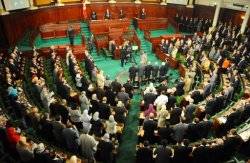Tunisia has entered a new era of democracy with the inaugural session of its democratically elected constituent assembly, 10 months after a popular uprising ended the rule of Zine El Abidine Ben Ali.
The 217-member assembly, the first elected body of the Arab Spring, confirmed on Tuesday a deal whereby the Ennahdha and two other parties divide the country's top three jobs between themselves.
As they had agreed, Ettakatol's Mustapha Ben Jaafar will be the president of the new assembly after he won 145 out of 217 votes. Results were announced shortly after 5pm local time on Tuesday evening.
Maya Jribi of the centre-left Progressive Democratic Party (PDP) - an opposition party - will be appointed vice-president, after winning 68 votes.
Tunisia's three main political parties formalised on Monday a power-sharing agreement reached in the wake of last month's polls.
In addition to Ben Jaafar’s appointment to the chair, Ennahdha's Hamadi Jebali is to take the post of prime minister, while the Congress for the Republic (CPR) party's Moncef Marzouki will become president
Samir Dillou, a member of Ennahdha’s executive bureau, said that ministers will not be appointed until the role of the prime minister has been defined.
Second independence
The politicians, who will be entrusted with drafting a new constitution and paving the way for fresh elections, sang the national anthem as the session got under way in the Bardo palace, on the outskirts of Tunis.
"I give thanks to God, to all those martyred and wounded and those who fought so we could witness this historic day," Rachid Ghannouchi, the Ennahdha leader, said after the opening.
After Ben Ali's removal in January and the elections of October 23, the inauguration of the constituent assembly marked yet another landmark in Tunisia's democratic revolution.
"This event is like a second independence for Tunisia," said Ahmed Mestiri, a famous figure the struggle for Tunisia's 1956 independence from France.
The Bardo palace is full of historic significance for Tunisia.
"This place was all lies and pretence, now it becomes a real chamber representing the people. I am overcome with awe," Moncef Marzouki, Tunisia's president in waiting, told the AFP news agency.
Radiating with pride, the deputies embraced one another, chatted and laughed under the gilded cupola and glittering crystal chandelier of their new home.
Arab Spring pioneer
The revolt touched off a wave of pro-democracy protests across the region. Tunisians followed up their revolution last month with a landmark election for a constituent assembly.
Ennahdha, a moderate Islamist party inspired by Egypt's Muslim Brotherhood, holds 89 seats while the CPR and Ettakatol control 29 and 20 seats, respectively.
The chamber's freshly elected members are also expected to pick two deputy chairs and adopt a set of internal rules based on a document drafted by the now-dissolved body in charge of political reform.
Challenging the bloc formed by the three main parties, the PDP and the Democratic Modernist Pole, which have 16 and five seats, respectively, will be main opposition forces.
A question mark still hangs, however, over the Popular Petition, a previously unknown group lead by a London-based millionaire which came from nowhere to clinch 26 seats, making it the assembly's third largest party.
PHOTO CAPTION
Tunisia's newly elected assembly holds its inaugural meeting Tuesday, Nov. 22, 2011.
Al Jazeera


 Home
Home Discover Islam
Discover Islam Quran Recitations
Quran Recitations Lectures
Lectures
 Fatwa
Fatwa Articles
Articles Fiqh
Fiqh E-Books
E-Books Boys & Girls
Boys & Girls  Women
Women










